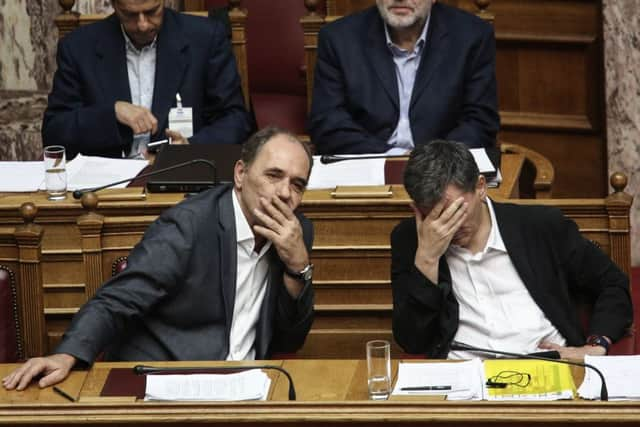Greek government stands by new bailout plan


The draft bill for the three-year rescue package worth about €85 billion (£60bn) in loans includes harsh spending cuts and tax hikes that Mr Tsipras has said he has no option but to implement.
MPs wrangled over the bill for hours in an acrimonious parliamentary committee debate that began in the morning, with delays arising from amendments submitted to the original bill and procedural objections by those opposing the measures.
Advertisement
Hide AdAdvertisement
Hide AdVoting was unlikely until the early hours of today. Finance minister Euclid Tsakalotos stressed the urgency of the vote, with eurozone finance ministers to discuss the deal at a meeting on this afternoon in Brussels.
The Syriza rebellion has left Mr Tsipras dependent on opposition votes in parliament to pass legislation, and the bill was expected to win approval comfortably. Hundreds of anti-austerity protesters marched through Athens in anticipation of the plenary debate last night.
Mr Tsipras’ radical left party won elections in January on promises to repeal similar budget austerity imposed in return for Greece’s two previous bailouts. His about-face, agreeing this week to tough terms with creditor negotiators from the European Central Bank, European Commission and International Monetary Fund, has led to outrage among hardliners that now threatens to split the party.
Former energy minister Panagiotis Lafazanis, a Syriza hardliner who lost his cabinet position last month after voting against another bailout-related bill, took a step towards a full split with his party yesterday, joining a group of another 12 left-wing politicians announcing they will create a new anti-bailout movement.
He stopped short, however, of saying he was leaving his party.
His move “finalises his decision, taken a while ago, to choose a different path than the government and Syriza”, the government said in an e-mailed note.
The internal party problems have increased speculation, fanned by some Syriza members themselves, that Mr Tsipras might have to call early elections as soon as September.
The deal still needs the approval of eurozone finance ministers and that of several other countries’ parliaments, including Germany’s.
Advertisement
Hide AdAdvertisement
Hide AdGermany, which was the largest single contributor to Greece’s two previous bailouts, has been the country’s harshest critic and has maintained a cautious stance.
German deputy finance minister Jens Spahn said yesterday that “Germany isn’t the only country that is still asking questions at the moment”.
Mr Spahn said the Greek government clearly recognises its country must change if it wants to remain in the eurozone. He said it was normal “that questions are asked”.